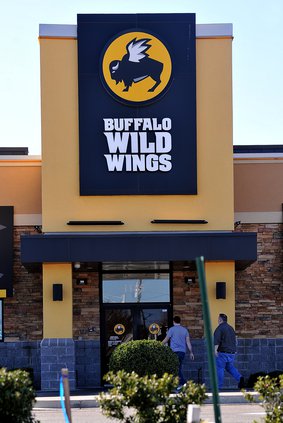Star Tribune, Minneapolis
Buffalo Wild Wings, a casual restaurant chain with a location on Dawsonville Highway in Gainesville, is being purchased by an Atlanta investment firm that owns fast-food brands Arby’s and Jimmy John’s.
The company had grown quickly, taking advantage of the rise of high-definition TVs, multiple sources of sports programs and the craft beer craze to create a high-energy destination for families and sports fans.
The $2.9 billion deal, announced before stock trading began Tuesday morning, represents the abrupt exit of an activist shareholder who in June won control of Buffalo Wild Wings in a proxy battle with company management.
The activist shareholder, Mick McGuire of San Francisco-based Marcato Capital, for months told the company’s shareholders he had a strategy to double or triple the Golden Valley, Minn.-based company’s value by 2021 and was in it for the long term. But in less than six months, he sold the company at around the same price he paid to buy shares in it.
The company’s longtime leader, chief executive Sally Smith, announced her retirement when McGuire won control. And by early September, Buffalo Wild Wings shares had lost nearly one-third of their value as its direction foundered. The shares got a small boost in October when results for the fall quarter turned out better than expected and a large one two weeks ago when news emerged that McGuire was seeking a buyer.
Under the terms of the transaction, affiliates of Roark Capital Group will pay $157 a share for Buffalo Wild Wings, just a few dollars more than the $150 price that the company traded at on the day Marcato and McGuire won the proxy battle in June. Buffalo Wild Wings shares jumped around 6 percent to $156 in early trading Tuesday.
It wasn’t immediately clear whether Marcato made money on its investment and abortive attempt to remake Buffalo Wild Wings. McGuire wasn’t available for comment, a Marcato spokeswoman said.
Roark-owned Arby’s Restaurant Group Inc. will operate the approximately 1,200 Buffalo Wild Wings locations as an independent subsidiary. The 1185 Dawsonville Highway location is one of 11 locations in and around metro Atlanta.
Roark Capital has over the past decade purchased some of the nation’s largest and best-known restaurant chains. Its portfolio includes controlling stakes in Arby’s, Auntie Anne’s, Carl’s Jr., Cinnabon, Hardees, Jimmy John’s, Naf Naf Grill, Schlotzsky’s and Wingstop. It owns a minority stake in Wisconsin-based Culver’s.
“We are excited about this merger and confident Arby’s represents an excellent partner for Buffalo Wild Wings,” Smith, who has remained CEO while the company searched for a successor, said in a statement. “This transaction provides compelling value to our shareholders.”
Arby’s CEO, Paul Brown, added, “Buffalo Wild Wings is one of the most distinctive and successful entertainment and casual dining restaurant companies in America. We are excited to welcome a brand with such a rich heritage.”
Arby’s, founded in 1964, is the second-largest sandwich restaurant brand in the world with more than 3,300 restaurants in seven countries.
Buffalo Wild Wings grew out of a wings restaurant that opened near the Ohio State University campus in Columbus in 1982. Within a few years, it added several locations around Ohio and the Midwest and Ken Dahlberg, the Twin Cities businessman who created the Miracle-Ear hearing aid, became its principal investor and owner. In 1991, he started to franchise the concept.
Three years later, after Buffalo Wild Wings had grown to about 30 locations, Dahlberg hired Smith as chief financial officer to bring some order to its chaotic finances and a messy tax situation. In 1996, he made her the company’s chief executive.
When Buffalo Wild Wings in 2003 filed to sell shares to the public, it had 217 locations in 27 states, 77 that it owned directly and the rest owned and operated by franchisees.
As a publicly-traded company, Buffalo Wild Wings grew in locations and revenue at one of the strongest rates in the fast casual dining industry.
The company’s growth started to level off about three years ago and executives considered developing pizza and Mexican food restaurants. In the last two years, the company confronted skyrocketing costs for chicken wings, its highest expense. Attempts to raise prices led to customer complaints.
Marcato’s McGuire in the summer of 2016 bought a sizable stake in the company and began to publicly criticize executives, particularly over the diversification moves. He said the company should sell the locations it owned to franchisees and give the proceeds to shareholders.
At the end of September, its latest reporting period, the company had 1,247 Buffalo Wild Wings locations, 628 owned by the company and the rest by franchisees, and a small chain of 24 taco restaurants.

